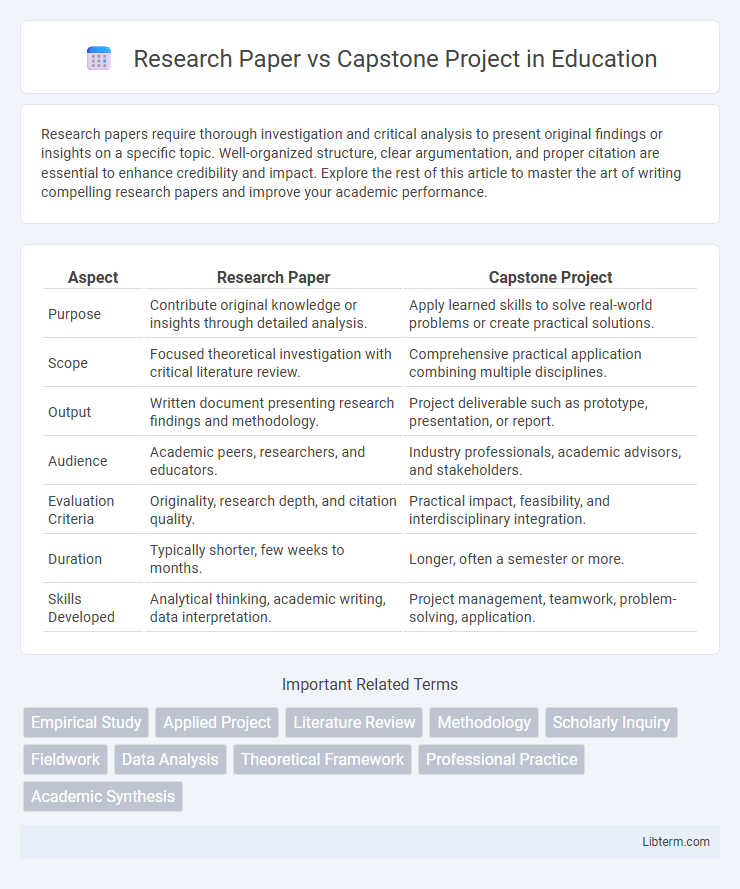Research papers require thorough investigation and critical analysis to present original findings or insights on a specific topic. Well-organized structure, clear argumentation, and proper citation are essential to enhance credibility and impact. Explore the rest of this article to master the art of writing compelling research papers and improve your academic performance.
Table of Comparison
| Aspect | Research Paper | Capstone Project |
|---|---|---|
| Purpose | Contribute original knowledge or insights through detailed analysis. | Apply learned skills to solve real-world problems or create practical solutions. |
| Scope | Focused theoretical investigation with critical literature review. | Comprehensive practical application combining multiple disciplines. |
| Output | Written document presenting research findings and methodology. | Project deliverable such as prototype, presentation, or report. |
| Audience | Academic peers, researchers, and educators. | Industry professionals, academic advisors, and stakeholders. |
| Evaluation Criteria | Originality, research depth, and citation quality. | Practical impact, feasibility, and interdisciplinary integration. |
| Duration | Typically shorter, few weeks to months. | Longer, often a semester or more. |
| Skills Developed | Analytical thinking, academic writing, data interpretation. | Project management, teamwork, problem-solving, application. |
Introduction to Research Papers and Capstone Projects
Research papers provide a structured analysis on a specific topic by reviewing existing literature, formulating a hypothesis, and presenting evidence-based conclusions. Capstone projects integrate knowledge from coursework to solve real-world problems, often combining research, design, and practical application. Both require clear objectives, methodology, and formal documentation, but capstone projects emphasize experiential learning and interdisciplinary solutions.
Definitions: What is a Research Paper?
A research paper is a detailed academic document presenting an original argument or analysis based on thorough investigation and critical evaluation of existing literature and data. It systematically explores a specific topic or question, using evidence to support conclusions, often following formal methodologies and citation standards. The primary goal of a research paper is to contribute new insights or understanding to a field through organized scholarly writing.
Definitions: What is a Capstone Project?
A Capstone Project is a comprehensive academic assignment that integrates knowledge and skills acquired throughout a course, requiring students to solve real-world problems or design practical solutions. It typically involves project-based learning, collaboration, and application of theoretical concepts in a tangible outcome, such as a product, presentation, or report. Unlike a research paper, which primarily focuses on hypothesis testing and data analysis, a Capstone Project emphasizes experiential learning and interdisciplinary approaches.
Core Objectives and Purposes
Research papers focus on contributing to existing knowledge by presenting detailed analysis, evidence, and arguments on a specific topic, aiming to advance academic understanding. Capstone projects emphasize practical application of skills and knowledge gained throughout a course, often involving problem-solving, real-world data, or creating a tangible product. The core objective of research papers is knowledge generation and scholarly communication, while capstone projects prioritize integration, demonstration of competencies, and readiness for professional practice.
Structural Differences and Format
Research papers typically follow a rigid structure consisting of an abstract, introduction, literature review, methodology, results, discussion, and conclusion, emphasizing detailed data analysis and scholarly sources. Capstone projects combine research with practical application, featuring a proposal, project development or implementation section, evaluation, and reflection, often culminating in a tangible product or solution. The format of research papers prioritizes academic rigor and citation style compliance, while capstone projects demand integration of interdisciplinary knowledge and real-world problem-solving documentation.
Research Methodologies and Data Collection
Research papers typically emphasize rigorous research methodologies such as experimental designs, surveys, and qualitative analysis, aiming to contribute new knowledge through systematic data collection and validation. Capstone projects integrate applied research methods, often combining qualitative and quantitative data collection techniques like case studies, interviews, and practical experiments to solve real-world problems. Both approaches require ethical considerations and robust data collection protocols, but research papers prioritize theoretical frameworks while capstones focus on practical implementation.
Scope, Depth, and Scale of Work
Research papers typically emphasize focused scope with in-depth analysis of a specific question or hypothesis, often based on existing literature and data. Capstone projects encompass broader scope and scale, integrating multidisciplinary knowledge with practical application, designed to solve real-world problems or demonstrate comprehensive understanding. Depth in capstone projects is manifested through hands-on experience and synthesis, while research papers prioritize theoretical depth and critical evaluation.
Assessment, Evaluation, and Outcomes
Assessment of research papers primarily emphasizes critical analysis, methodological rigor, and contribution to existing knowledge, while capstone projects are evaluated on practical application, problem-solving skills, and integration of multidisciplinary learning. Evaluation criteria for research papers include clarity of hypothesis, data interpretation, and academic writing quality, whereas capstone projects focus on project execution, real-world impact, and presentation effectiveness. Outcomes of research papers often lead to scholarly publications and theoretical advancements, contrasting with capstone projects that result in tangible solutions, prototypes, or implemented strategies benefiting industry or community.
Academic and Professional Relevance
A research paper primarily emphasizes in-depth analysis and critical thinking within a specific academic discipline, serving as a foundation for scholarly communication and contributing to academic knowledge. A capstone project integrates practical skills and theoretical knowledge by addressing real-world problems, highlighting professional application and readiness for industry challenges. Both forms are crucial for academic achievement, but capstone projects often hold greater professional relevance by demonstrating applied expertise and problem-solving abilities.
Choosing Between a Research Paper and Capstone Project
Choosing between a research paper and a capstone project depends on your academic goals and practical experience preferences. Research papers emphasize in-depth analysis and scholarly contribution, ideal for students aiming for academic or research careers. Capstone projects focus on applying knowledge to real-world problems, benefiting those seeking hands-on skills and professional portfolio development.
Research Paper Infographic

 libterm.com
libterm.com